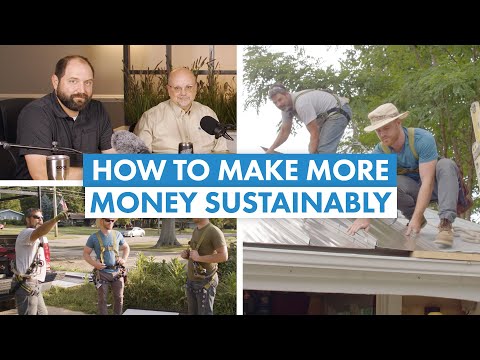How to Go From Good to Great as a Roofing Business Owner

- Today, we're talking about "How to go from Good to Great as a Roofing Contractor," in terms of profitability, growth, value to customers and being an employer of choice. (upbeat music) What's up guys, welcome to the "Metal Roofing Channel." Welcome to Q & A Mondays. I'm Thad Barnette. Make sure you subscribe if you're new.
We release metal roofing and metal construction content every Monday and Wednesday. Today, we are talking about being a contractor in the roofing industry whether it's metal shingles, flat roofing, whatever. We're talking about how to go from good to great in terms of company growth, profitability being an employer of choice and providing the most value and the best product possible to your customers. To help me out, I have Adam Mazella from Sheffield Metals and Todd Miller from Isaiah Industries. Thank you both for being here. When we say good to great, a lot of people think about the Jim Collins book, talking about culture, you know.
Very popular book it's been around for a while now. We're talking about something very specific when it comes to roofing contractors. What does great mean? What are we gonna cover here? - To me, it means a lot in terms of sustainability. So a business hits a size and I think profitability plays into it really big but you've gotta have all those Jim Collins things in place. You gotta have the culture, the mission all those things in place to reach this point.
But you know it's that contractor that hits a point where, okay, things are firing on all cylinders. The business is gonna be sustainable over the long term which you know, of course ultimately who that benefits the most is is your customers and your team members both to have that kind of sustainability. You know, that said I think every company owner is gonna have some different goals and some different thoughts on what great means to them. But I do think a big one as part of that sustainability also is the company owner feels like you know, I could take off a couple weeks and things are gonna keep going without me. So you've got that empowered organization. You've trained people to do those things that you used to have to do when you had to wear every hat in the company, or on the other hand heaven forbid someone got sick for an extended period of time.
We've certainly seen businesses that just basically were forced to close up because that leadership was no longer there. Sometimes the whole reason the leadership got sick was because they were doing everything and they didn't have an empowered organization. So I think a lot of that great comes through empowerment and creating a sustainable organization. - Yeah, and oftentimes it really can be a natural progression for a contractor. As a contractor, as an owner oftentimes, an operator, as well, you know, you're working in the business rather than on the business.
And just from our perspective it's really the guys that can make that jump from good to great are the people that figure out a way to be able to work on the business and not just be in the business every day. And sometimes that comes with a conscious effort of that other times, we see guys say, "I'm getting ground down, I'm getting worn down from being on a roof every day, my body can't take it." And they figure out a way to, I don't wanna say, make them replaceable but the processes that they have in the organization making 'em repeatable making 'em scalable and then they can focus on the business rather than in the business. - Yeah, we're gonna talk about several ways to get there including growth and profitability. So how do you take your company from level one to level two to level three, if that's what you want as a business owner? - So I did see someone speak on this recently who made the most sense of it that I'd ever seen made. And basically he laid out four different sizes of contracting companies and gave a really good description of each.
It all kind of culminated in what their annual sales were but then he talked about, "Okay this is probably what your cash flow is. This is probably what you have in the bank. This is the number of hats that the owner of the company is still wearing." And he would show a progression. But I think that, it's easy to sit there and look at that and a contractor might see, "Okay, well I'm a level one contractor. I really want to be level three.
Well, how do you get from there to there? And this particular speaker, and it was Frank Farmer from American Metal Roofs up in Michigan. And he was basically saying you've got to have yourself financially resourced as a level two company while you're still a level one company if you're gonna make that jump to level two. And ultimately a lot of times these levels were driven again by annual sales.
So he was saying, "Okay, in order to have the annual sales of a level two company you've got to have the marketing dollars of a level two company before you're really a level two company." So he talked a lot about how you re retain some of those resources and finances within a company, so that you can make that growth. Again, some contractors I've known many contractors I'm sure you have as well, Adam, who wanted to be a level one. and they were very adamant that no, this is what I wanna be.
And that's perfect. I mean, God bless 'em, we need that variety. But for the guys that want to grow into higher levels, you gotta have that pathway. And ultimately it's gonna require profitability and resources.
I think probably with the cost of advertising and everything, it's probably even more than it was 20 years ago in terms of what it's gonna take to make that leap. - Adam, do you have any thoughts on how a company can grow sustainably with those resources? Make sure they have that foundation, and what have you seen with working with contractors every single day? - Yeah, so we, I think when we say good, we're already making some basic assumptions that a good contractor has got their safety record in check. I mean, that's one way to take out really any business regardless of size is not being a safety oriented company especially in a high risk industry, like we're in.
Also additional assumptions that you know what you're doing. So you're aligned with a manufacturer, manufacturers, you know how to install things, install things the right way. Really, from there, I mentioned earlier about scaling up processes and making things repeatable so people know what they're doing when they step onto the job site. I mean, you mentioned Frank previously, that seems like a really fascinating business model, but one of the biggest things that we look at is almost out kicking your coverage.
So to me what Todd is talking about is fiscal responsibility and not out kicking your coverage on skill, will of your team and the ability of your team. So, you know, focusing on your business as a true business owner is the quickest way to get there. Not taking on undue risk. I mean, if you take on a project that if one thing goes wrong, it can wipe you out.
You know, that's not how you're going to make your leap. If you're going to try to scale up by buying business you're always gonna be robbing Peter to pay Paul. It really is about setting a sustainable scalable model, or really where you're trying to make leaps, aren't going to put you at risk or put your business at risk.
- Yeah and that's one of the things that could really cause some damage to a business, as well as trying to scale up too quickly without that initial infrastructure and resources in place We've seen a lot of businesses in the construction industry really either struggle or go out of business entirely because they just weren't ready for that extra demand, that extra income and they didn't have that infrastructure set up. Along those same lines, what are some maybe mistakes or challenges or pitfalls that could be there for a business owner if they're trying to scale up too quickly or they're trying to grow as a company? - I'm gonna steal another thing from good to great. And that's say, I talk about this with our team all the time. It's that adage of your 20 mile March? What are you doing day in day out that isn't above and beyond what your ability is to do.
So it's not, "Well some days we're gonna do less, other days we're gonna do way more, because the skies are clear and we can chase it down." It's doing what you can do with the resources you have available to you without overextending yourself. So again, that Collins that 20 mile March and doing it day in day out and relating that to a contractor. If you're really good at metal shingles and standing seam metal roofing, and somebody comes to you and says, "Hey, I've got this great opportunity for a a flat roof TPO installation?.
And you don't know that that's going outside of your 20 mile March. There's things you could do to get there but that's not the logical progression where somebody says, "Hey, I got this great job for you and you don't know what you're doing on it. That's not a great job." So it's staying within your wheelhouse, staying within that 20 mile March, not overextending yourself and not going under and day in day out doing the right thing. - And something else is that sets a good example for your employees, as well.
If you, as a business owner are willing to take those risks and they see themselves in that position, you know they might not be so thrilled about staying with the company or having that same mentality of doing what you're good at, doing the best you can with what you're what you're there to do. - I think another thing that I often advise to companies who want to go through that growth pattern from level one to level two, whatever, is have your organizational chart in place for the size of company you wanna be. One of the things that oftentimes companies do is they just sort of grow organically, is they keep raising team members to higher levels. And eventually you've raised that team member to a higher level than they're capable of handling. On the other hand, if you had an org chart that was laid out for the size of company you wanted to be, then you make that pathway clear and perhaps some team members see that, "Okay, I'm gonna make it to here.
I probably don't have the skills required to be here." When we, as a company, reach the size that we need someone in this position, they're gonna hire somebody else. - That's a great point. - So it takes away some of those assumptions that, "Oh I'm here and someday that's gonna be me. But I think that org chart is really, really important to show how your company's gonna grow. Doesn't mean it's written in stone, right? Changes happen, you may have to change it.
- It's kinda like dress for the job you want when it comes to organizational structure. - [Adam] Right, exactly. - And it takes a level of strategic thinking, strategic planning. I mean, I don't wanna say it's easy to wake up one day as a contractor and say, "Oh my gosh I've got a mess on my hands, but that happens.
And do you wanna continue to be disjointed and not know where you're going and figure out where you're at on that growth scale. You know you can pull those things and then put process to it in a thought process that's going to help you either dig out of a hole or gain clarity on where you're at and ultimately where you wanna go. - Yeah, and we've talked about some really good tips for how to go from good to great, but from someone from Sheffield Metals, Isaiah Industries, you guys work with contractors day in, day out for years.
What are some things that you have seen contractors that go from good to great? Give me some practical things that you've seen. Those companies that are really, really successful you know, what are they doing, what have you seen? - They know their numbers. They track job costs very, very carefully. They know their marketing. They know that if I spend this much on marketing I can expect this much in terms of return. So knowing your numbers is really, really critical.
And that's something I see a lot of contractors they didn't get into this business in order to keep spreadsheets or watch numbers. They got into this business 'cause they like building and they like grading things. But if they really want to be serious about growing that business they need to know those numbers. And that in turn is gonna force them to look at the profitability of their company in order to grow those resources within their company so that they can grow to the next level. - Yeah and to me, I've seen, it's the people that wanna grow. So, you know, you might be good but what's it gonna take to be a great metal shingle installer, what's it going to take to be a great standing seam metal roof installer.
And it's knowing the details, it's not running and hiding from questions that a homeowner that might have for you and being able to explain certain things and why things cost a certain way and ultimately letting your work speak for itself. So don't make your work the best kept secret. And I mean, you're talking to a bunch of people that love marketing sitting here at this table but there's simple things that you can do as a contractor to let people know how great you are even though you might just be good right now. And so letting people know via social media that you do good work, spread the word and and that can help you in your growth strategy as well. - And if you wanna get to that next level you're gonna have to learn what it takes to get to that next level.
So what tips do you have for a business owner how do they get that knowledge? - Well, I don't think it's just the knowledge their own knowledge, it's also building that knowledge into their team and developing those skills within their team. First of all, I think every business owner needs to realize that when they're out recruiting and hiring, you're looking for people smarter than you. Frankly, that's a tough thing for a lot of guys to do and it's tough, probably even more difficult sometimes for your mid-level managers to do it because they really start to see that as a threat, but you gotta make it clear within your entire organization that we're always looking for smarter people and better skills and additional skills. That said, I think aligning yourself with manufacturers, with trade associations, any place you can suck up training and knowledge is very important. Adam, you had touched earlier on the importance of as you grow, working on your business not always in it.
And, of course, it's a pretty easy read and a fairly simple book and it's probably been out for 40 years, but Michael Gerber's book, "The E Myth" is a great book that really goes through that process of, "Okay, how do I create a business that is going to be greater than myself? How do I work on the business so that I don't always have to work in the business?" And so there's some great resources out there. - And there's some challenges. I mean, you might be talking to a contractor. This is very prominent in our industry, Todd Miller Roofing.
If you're Todd Miller and Todd Miller Roofing you know it's easy to get caught up and say, "Hey, everything needs to come to me, to flow through me. I am the expert rather than what you said, is you guys need to be the experts. You guys need to make the powerful decisions.
I've given you guidance, given you the tools you need to know to be able to make those decisions. And that's really difficult as a business owner. And so it's understanding that the business needs to be bigger than you but also not take on a life of its own.
- And a real key to that too, again is how well is that business financially resourced? What are their profit margins? Do they have some fallback money, if you will. Yeah, one of the things is, as you grow the business and you empower people more you've got to give your team members the permission to fail. And they've got to know that, "Okay I may mess it up this time and I'm not gonna get fired." Well, the reality is if there's no financial resources as backup in that company they may get fired because they mess up something.
And so they don't ever feel like they have that permission to fail. And that's part of anyone's growth is giving them that, "Hey it's okay if this doesn't go right but let's try it because it's your idea, let's see what happens." - Yeah and you know, just a few other things is you may have been installing metal roofs for a year, five years, 10 years, what are the metal roof manufacturers saying? You may have learned it and come up and now you have your own business but what are the major metal roof manufacturers saying? You know, am I installing things per their details or could I be creating exposure for myself and my company. Putting a cap on what you can learn and what you think is right is a quick way to max out your growth capability.
So like I said, there's a few things that can really take you out and safety being probably number one the other things are doing things wrong in a repeated way for a long time. So it is good to check with the industry and say, "Hey, am I installing this metal roof right? Hey, what's the latest and greatest? It's great to be able to go to the IRE or NCA show and catch some seminars, take your people to your seminars. So you might be shutting your business down for a few days or lessening your output for a few days but it's being able to grow, understand what's the latest, greatest, current technology. - You know, I think it's important for any business owner to be very introspective and self reflective.
And you brought up such good points as far as, am I doing things right? And any time I have a contractor, tell me, "You know Todd, I know everyone else does it this way, but we do it this way." Oh my goodness. I mean, I'm just automatically getting the heebie jeebies, cause I'm wondering what they're gonna show me. So I've had a contractor I've seen in recent years who is installing standing seam products with what I would call closed valley.
And you know, they're in an area where there's lots of trees, plus there's ice and snow. It's not our customer but when I've talked to him, I can't get him convinced that you're building yourself a world of liability here with what you're doing just because you're not wanting to take steps to do it the way that everyone else does it, which is the right way in that case. - Awesome, well, thanks so much for the information and knowledge guys really appreciate it. I think we covered a lot of good things from how to go from good to great as a contractor. If you have any questions, please comment down below.
We'd love to answer them in a future episode. So Todd, can you tell everyone about your podcast, "The Construction Disruption?" - Yeah, thank you, I appreciate the opportunity. So we looked at the industry and we said, we need to recruit more folks into the construction industry and how do we do that? And you know what we wanted to do was to go out and create a resource. so folks can learn about the newest and greatest things happening in our industry whether that's construction practices or products or some of the tech that's coming into our industry. And so we go out and we research and we find those things and we bring guests onto spotlight to talk about them.
So folks who turn into the podcast, it's construction-disruption.com. can really learn about some of those new, great things that are gonna shape our industry going forward and it may be great career opportunities for them also. - All right, well, thank you both for joining me today. Make sure you subscribe here to the "Metal Roofing Channel."
As always I'm Thab Barnette, we'll catch you next time. (upbeat music)
2022-06-09 08:04


